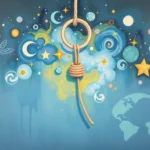
Introduction
Dreams have long been a source of fascination, offering a glimpse into our subconscious minds and revealing our deepest fears, desires, and thoughts. Among the myriad of dreams that people experience, one particularly poignant theme is that of feeling lost. This feeling often manifests in various forms—whether it’s wandering through an unfamiliar landscape, searching for a loved one, or losing track of time and space. The symbolism behind feeling lost in a dream can be both powerful and revealing, providing insights into our waking lives and emotional states. As we explore the intricate layers of this dream, we can uncover its significance and the messages it may bear for our daily existence.
Symbolism and Meaning
When we delve into the symbolism of feeling lost in a dream, we encounter a rich tapestry of meanings. Loss itself is a fundamental concept that resonates deeply with our human experience. It often reflects a sense of disorientation, uncertainty, and a quest for direction. In many cases, feeling lost can signify a disconnect from our goals, values, or identity. For instance, if you dream of wandering through a dense forest without a clear path, it may symbolize feelings of confusion or being overwhelmed in your waking life.
The landscape in which you find yourself lost can also offer valuable insights. A dark, chaotic environment might reflect inner turmoil or anxiety, while a serene yet unfamiliar setting could represent unexplored potential or opportunities. People encountered in these dreams can further enhance the interpretation. A lost loved one might symbolize unresolved issues in that relationship or a longing for connection. Conversely, meeting a stranger while lost may represent the emergence of new aspects of your personality or the need to seek help from others.
Moreover, the act of searching can be a significant theme in these dreams. If you are actively trying to find your way, it may indicate a willingness to confront your challenges and find clarity in your life. On the other hand, a passive experience of being lost, such as standing still in confusion, could suggest avoidance or a fear of taking the necessary steps forward.
Key Scenarios and Variations
The experience of feeling lost can vary widely, leading to different interpretations based on the specific scenarios encountered in the dream. For example, dreaming about getting lost in a city might evoke feelings of isolation in a crowded world. This scenario often highlights a struggle to connect with others or find a sense of belonging. On the contrary, if you find yourself lost in a familiar place like your childhood home, it may suggest nostalgia or unresolved childhood issues that still influence your present life.
Another common variation is the dream of being lost at sea. This scenario typically symbolizes emotional turbulence and uncertainty. The vastness of the ocean can reflect overwhelming feelings or a fear of being adrift without direction. In contrast, a dream of being lost in a vast desert may evoke feelings of desolation and the search for meaning or purpose. The starkness of the desert landscape can signify a phase of introspection or a need for clarity in your life’s journey.
Consider also the scenario where you are lost during a significant event, such as a wedding or a job interview. This context can heighten feelings of anxiety and pressure. It may indicate fears about meeting expectations or the desire to be accepted in social or professional settings. In this case, the dream serves as a reminder to evaluate your self-worth and the pressures you place upon yourself.
Additionally, dreams can also feature recurring themes of feeling lost. If you frequently find yourself lost in various dream settings, it may suggest that you are grappling with ongoing issues in your waking life. This repetition can serve as a call to action, urging you to confront these challenges rather than avoiding them.
Real-Life Connections and Takeaways
Understanding the symbolism and scenarios of feeling lost in dreams can offer profound insights into our waking lives. These dreams often function as a mirror, reflecting our emotional states, relationships, and life circumstances. To gain deeper understanding, it’s essential for readers to engage in self-reflection after experiencing such dreams.
One effective approach is to maintain a dream journal. Writing down your dreams immediately upon waking can help capture the nuances and emotions associated with the experience. Over time, you may notice patterns or recurring themes that reveal underlying issues or concerns in your life. By documenting these dreams, you can begin to connect them with your daily experiences, thoughts, and feelings.
Another practical strategy is to explore the emotions felt during the dream. How did you feel while you were lost? Were you anxious, calm, frustrated, or liberated? These emotions can provide clues about your current state of mind. For instance, if you felt panic while lost, it might indicate that you are facing stress or uncertainty in your waking life. Conversely, feeling a sense of adventure could suggest that you are embracing change or new opportunities.
Engaging in mindfulness practices, such as meditation or deep breathing exercises, can also be beneficial. These practices encourage greater awareness of your thoughts and feelings, allowing you to process emotions related to feeling lost in your dreams. By cultivating mindfulness, you can gain clarity about the areas of your life that may require attention or change.
Lastly, consider reaching out to trusted friends or a therapist for support. Discussing your feelings of being lost can help you gain perspective and identify actionable steps to navigate your challenges. Sharing your experiences can also foster connections, reminding you that you are not alone in your struggles.
Conclusion
The experience of feeling lost in dreams is a common yet complex phenomenon that resonates with many individuals. By exploring the symbolism and varied scenarios associated with this dream, we can gain deeper insights into our emotional landscape and the challenges we face in our waking lives. Engaging in self-reflection, maintaining a dream journal, and practicing mindfulness can empower us to confront our feelings of disorientation and embrace personal growth.
As you reflect on your own experiences of feeling lost in dreams, consider what these messages may reveal about your life. Allow yourself the space to explore these emotions, and remember that feeling lost can also signify the potential for transformation and new beginnings. Embrace the journey, and let your dreams guide you toward a clearer path.







